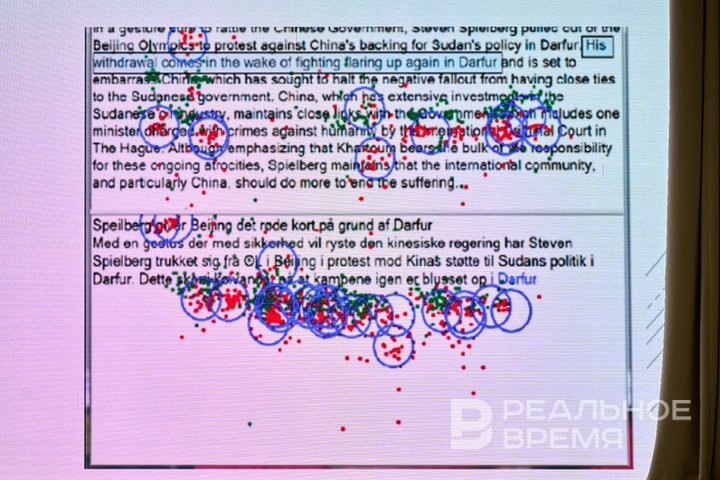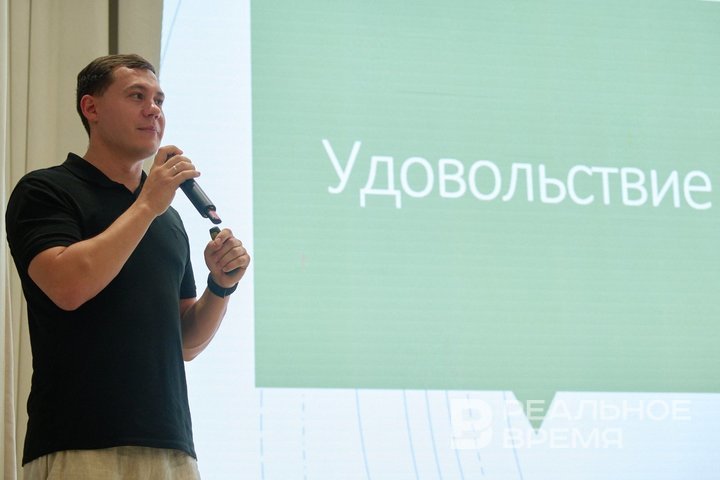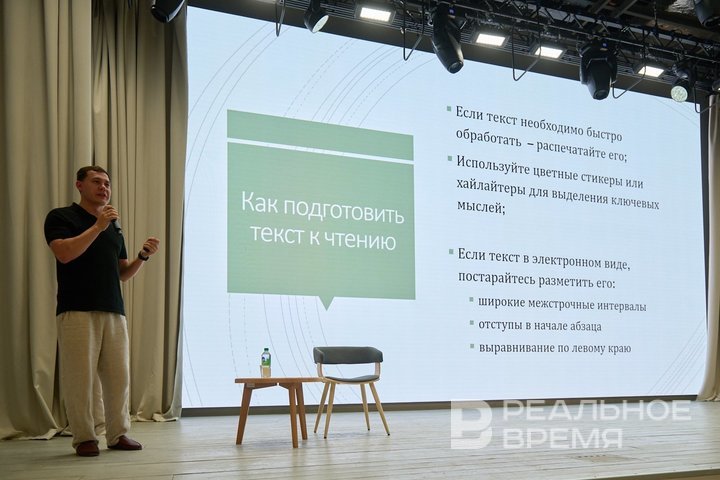Reading reduces stress levels in adults by 68%, and children start reading thanks to comics
Philologist Igor Guryanov explained how we read

Can a 2-year-old child start reading? What influences the perception of the text? Which books are better — paper or electronic? Associate Professor of the Department of Romano-Germanic Philology of the Institute of Philosophy and Mass Communication of Kazan Federal University Igor Guryanov spoke about all this in his lecture Reading: Process, Skill, Pleasure at the National Library of the Republic of Tatarstan.
Reading is a skill
Reading as a skill appeared approximately at the same time as writing, about 7,000-8,000 years ago. Before that, people either passed on information by word of mouth or received it through rock paintings. Libraries and the first alphabets appeared about 5,000 years ago. These were the Sumerian language and Scandinavian runes. It was no longer necessary to draw processes and actions. People learned to transmit information using universal symbols. According to Igor Guryanov, reading not aloud, which is like a visual process, appeared only in the 15th century. Before that, people read mostly out loud. These were heralds or other special people who read out handwritten texts, laws or a king’s verdicts at the main square of a city or village.
“Reading is quite a complex process, it needs to be learned. There is no separate lobe or area in the human brain that is responsible only for reading. Reading is a skill that appeared on the synthesis of the visual cortex of the brain. Approximately the same areas of the brain are involved in recognising another person’s face,” Igor Guryanov said during his lecture.

So reading is not a genetic process but a cultural and psychological phenomenon. According to Guryanov, the skill of reading can appear when a person has developed a stable language skill. Therefore, the philologist claims that a child cannot learn to read when he or she is two years old, by this time the vocabulary has not formed. Rather, the child simply imitates his reading parents.
We read in spurts
The process of reading is inextricably linked with the beautiful French word saccade, which is translated as “push” or “jerk.” Philologist Igor Guryanov said that people read with these saccades. These are fast, strictly coordinated eye movements that occur simultaneously and in one direction. If we stop at a word, it means that it has a key meaning for us. Such a semantic pause is called a fixation point. If we have a complex word or a complex sentence in front of us that we cannot understand with a quick reading, then we return in such leaps back and scan with our eyes again until we understand the meaning of what is written. Sometimes you have to jump back a sentence, sometimes a paragraph, and in the case of reading Leo Tolstoy’s War and Peace, even a few pages back.
“Eye trackers show that adults who read well skip about 70% of short words. These are mostly function words or frequently used words. Our brain is very lazy, so it makes up a lot. If we say ‘I left my grandmother,’ then in the phrase ‘I left my grandfather,’ the brain will jump to the last word. Because the bearers of Russian culture know the story of Kolobok well,” Guryanov said.

Of course, in his speech, Igor Guryanov mentioned three types of people who perceive information differently. Visuals have a good visual memory and can remember where a particular word was located in the text. Auditory learners perceive information by ear and remember the intonations with which certain words were pronounced. There are also kinesthetic learners who perceive information in parallel with some actions. For example, they can learn poems or a passage of text only when they walk back and forth around the room. Ideally, they would have a tennis ball that they would bounce with each word.
“Kinesthetic learners are the most interesting type. Such people are called fidgets at school. They cannot concentrate on one thing. They mainly perceive information using various senses. It is somewhat more difficult for kinesthetic learners at school because they need to sit quietly for 45 minutes and not even move their fingers. They often start clicking their pens during lessons. They need a little more time to remember information,” added Igor Guryanov about the third type of people.

In addition to these three, the philologist added another type — discrete learners. These are people who remember information only after running it through a logical apparatus. They love diagrams and charts. Igor Guryanov suggested that many IT specialists can be classified as this type. But he added that few discrete types have been identified so far. Although with the emergence of an increasing number of digital natives, that is to say, people who were already born with technology, the number in discrete people will increase significantly.
Reading on a screen or on paper?
This question has been very pressing for the last 20 years. But it seems that Patricia Alexander from the University of Maryland has found the answer. She conducted a large study among students when the participants said that they recognised and remembered information better if it was presented electronically. Then Alexander conducted research and compared how students who read on the screen remembered the text and students who read on paper. It turned out that they remembered and learned the information from paper better. Pablo Delgado from the University of Valencia came to the same conclusion. He found that if you need to quickly read and remember a text, it is better to read it from a paper medium.
California researcher Marian Wolfe noted that reading is not a natural process, unlike listening or speaking. There is no separate structure in the brain that would be responsible for reading. She compared this skill with sport. This means reading requires constant training. And like in sport, you should start with something easy and gradually complicate and increase the load.

Naomi Baron from the University of Washington also conducted a number of studies. She drew a conclusion that the quality of reading depends not only on the information carrier but also on our preliminary expectations of the text. If we think that the text is easy to read, then we will not make an effort.
“Preliminary expectations of the text are often associated with our habits. For example, if we are used to reading posts on social networks from our phones, that is, fairly easy information, then our brain automatically starts to turn on laziness mode. It understands that any information that comes to us from the screen will be easy. If we did not understand something from a post on social networks, nothing terrible will happen. Therefore, it is very important to filter and work with reading habits. Try to read not only posts in your phone but also complex literature. Naomi Baron also noted that when waiting to read an easy text, the reading speed increases, but the quality of the information memorised decreases,” explained Igor Guryanov.

Researcher Naomi Baron discovered another interesting point. Scrolling the newsfeed causes difficulties with text perception. The book has a certain book orientation. In it, the text is fixed in one place. We see the border of the text, the words do not jump up or down. They stand exactly where the typographer put them. Even after turning the page, we can quickly find the location of the word. But this does not happen when we read text in a browser, even divided by paragraphs. Naomi Baron calls this “endless text.” Scrolling this “endless text,” the reader always tries to remember the line where he stopped, so as not to lose orientation. This suggests a person needs to put more effort not to miss new parts of the text.
Baron went even further in her research. She also found that in the process of reading we create a mental map of the work. Some episodes of the plot are remembered for their location on the page. When reading on the screen, it is more difficult to build such a mental map, because there are no “beacons,” nothing for the eye to catch on to.

British scientists couldn’t help but be involved here. David Lewis from the University of Sussex studied relaxation methods after stress. He found that listening to music reduces stress by 61%, a cup of tea or coffee — by 54%, a walk — by 42%, video games — by 21%, and reading — by 68%.
And what about children?
One of the common questions from parents is how to instil love for reading in children. Igor Guryanov said that the best way is to read yourself. Over time, children will copy their parents’ behaviour and will begin to consider reading normal. You can also read with your child or read children’s literature separately and then discuss it together. And, of course, do not consider comics to be second-rate.
“Many parents say that comics are not literature. In fact, they are literature, and quite serious. Very significant and famous authors write comics. Comics are easy to read. But the main thing is that if a child does not read very well yet, comics can awaken interest in the plot. And it is quite possible that later the child will want to read the original and compare how the artist and the author reproduced this world,” summed up philologist Igor Guryanov.
Ekaterina Petrova is a book reviewer of Realnoe Vremya online newspaper, the author of Poppy Seed Muffins Telegram channel and founder of the first online subscription book club Makulatura.